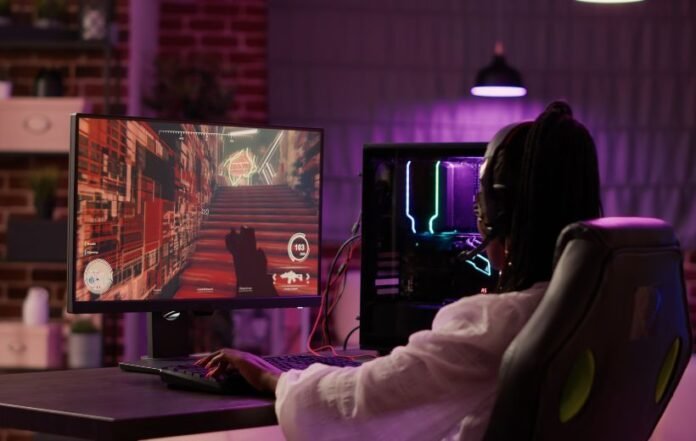Introduction to Gamified Learning
In the modern digital landscape, EGamer has emerged as more than just a platform for entertainment. It has positioned itself as a dynamic space where gamified learning and cognitive development intersect, offering players both enjoyment and intellectual growth. By combining interactive challenges with educational elements, the platform transforms traditional learning into an engaging, skill-building experience that resonates with a global audience of diverse age groups.
The Concept of Gamified Learning
Gamified learning refers to the integration of gaming mechanics—such as points, levels, rewards, and challenges—into educational activities. EGamer utilizes this concept effectively by designing environments where players must use problem-solving, strategic thinking, and memory recall to advance. Instead of passively absorbing information, learners engage actively, which strengthens retention and understanding. This shift toward experiential learning enhances cognitive capabilities while keeping users motivated.
How EGamer Encourages Cognitive Development
The connection between gaming and cognitive growth has long been studied, and EGamer builds on this research by offering games that stimulate mental processes. Tasks within the platform encourage quick decision-making, logical reasoning, and multitasking, all of which contribute to brain development. Games that require strategy planning sharpen analytical skills, while puzzles and simulations boost memory, focus, and adaptability. In this way, the platform not only entertains but also nurtures mental agility and resilience.
Boosting Problem-Solving and Critical Thinking
Problem-solving is at the heart of cognitive learning, and EGamer integrates this into its ecosystem seamlessly. Players encounter scenarios where they must analyze situations, predict outcomes, and create effective strategies. This practice directly develops critical thinking skills, which are transferable to real-world situations such as academics, workplace problem-solving, and decision-making in daily life. By mastering these skills in a gamified context, individuals gain confidence in their cognitive abilities outside of gaming.
Enhancing Memory and Concentration
One of the strongest benefits of gamified environments is the enhancement of memory and concentration. EGamer structures its interactive experiences so that players must recall past information, track progress, and apply learned strategies to move forward. This repetitive reinforcement strengthens short-term and long-term memory functions. Furthermore, the immersive nature of gameplay requires sustained attention, which trains individuals to focus deeply for longer periods—a skill valuable in both educational and professional environments.
Motivation Through Reward Systems
Traditional learning often struggles with maintaining student motivation, but gamified learning thrives on reward systems. EGamer uses leaderboards, achievement badges, and progress tracking to encourage continuous effort. These elements tap into intrinsic and extrinsic motivation, making users more willing to participate consistently. The anticipation of rewards not only fuels persistence but also fosters a sense of accomplishment, reinforcing the idea that learning can be both rewarding and enjoyable.
Social and Collaborative Learning Benefits
Another distinctive aspect of EGamer is its emphasis on social interaction and collaboration. Multiplayer features and community engagement create opportunities for teamwork, communication, and knowledge-sharing. By participating in group challenges or co-op missions, players learn to coordinate, delegate responsibilities, and respect different perspectives. This collaborative environment reflects real-world dynamics, preparing individuals for academic projects, workplace collaboration, and effective social communication.
Application in Education and Professional Training
Beyond personal use, EGamer has practical applications in education and professional training. Schools and institutions can integrate its gamified modules to make learning interactive and appealing to students. Complex subjects such as mathematics, science, or languages can be taught through game-based scenarios, reducing stress and increasing engagement. Similarly, in professional training, employees can acquire and refine skills in simulations that mirror real-world tasks, from leadership development to technical training.
Impact on Lifelong Learning
Lifelong learning is increasingly important in a rapidly changing world, and EGamer supports this by making learning flexible, enjoyable, and ongoing. Unlike traditional systems that may disengage learners after formal education, the platform keeps curiosity alive by offering evolving challenges. Adults and professionals can continue sharpening their cognitive skills through accessible, game-based modules, ensuring that learning never becomes stagnant.
Future Potential of Gamified Cognitive Development
As technology continues to evolve, EGamer has the potential to expand its role in cognitive development even further. With the integration of artificial intelligence, virtual reality, and adaptive learning systems, the platform could create highly personalized learning paths tailored to individual strengths and weaknesses. Such innovations would make gamified learning more precise, impactful, and widely applicable across education, corporate training, and personal development sectors.
Conclusion
EGamer demonstrates that gaming is no longer confined to leisure; it is now a hub for education, skill-building, and cognitive enhancement. By combining gamified learning strategies with engaging content, it provides users with tools to develop problem-solving, memory, focus, and collaboration skills. Its impact extends beyond entertainment, influencing how people learn, interact, and grow intellectually in the digital age. With continued innovation, the platform is set to redefine how gamified experiences contribute to human development and lifelong learning.



